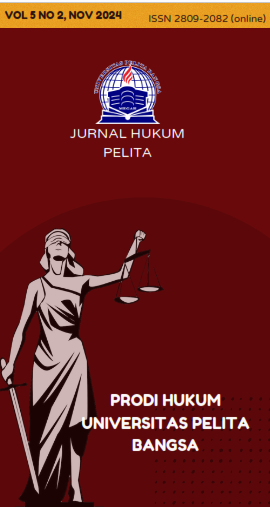Konsep Ellected Official Sebagai Syarat Pencalonanan Presiden dan Wakil Presiden Perspektif Maslahah
DOI:
https://doi.org/10.37366/jh.v5i2.5170Keywords:
Constitutional Court Decision, , Elected Official, maslahahAbstract
Constitutional Court Decision Number: 90/PUU-XXI/2023 is a decision relating to the requirements for presidential and vice presidential candidates. The basis for filing the lawsuit is Law Number 7 of 2017 concerning General Elections. The results of this decision state that the age limit for presidential and vice presidential candidates is 40 years or that they are currently occupying positions elected through general elections (Elected Official). Literature research with researchers utilizing the Constitutional Court Decision as a primary source, and secondary data sources using books and journals. Research shows that the concept of Elected Official in the Constitutional Court decision refers to the judge's view. According to Constitutional Justices Enny Nurbaningsih and Daniel Yusmic P. Foekh, what is meant by officials is elected through elections (Elected Official), here the governor is the regional head. M. Guntur Hamzah mentioned that the officials elected through elections (Elected Official) are the President, Vice President, DPR, DPD, DPRD, Governor/Deputy Governor, Regent/Deputy Regent, Mayor/Deputy Mayor. The Maslahah perspective views the concept of Ellected Official as being categorized as Maslahah Tahsiniyyah. Maslahah Tahsiniyyah to complete human life. The benefits of Tahsiniyyah need to be fulfilled to provide peace
Keyword : Constitutional Court Decision, Elected Official, Maslahah
References
Ali Masykur Musa, Sistem Pemilu: Proporsional Terbuka Setengah Hati, (Jakarta: Pustaka Indonesia Satu (PIS) kerja sama Parliamentary Support and Public Participation, 2003), h. 162.
Abdurashid Solijonov, Electoral Justice regulations Around the World: Key findings from International IDEA’s global research on electoral dispute- resolutions systems, International IDEA, Sweden, 2016.
Al-Suyuthi, Al-Asbah wal-Nazhair fi Qawaid Wa Furu Fiqh al-Safiiyah (Beirut: Dar Al Kotob Al-Ilmiyah, 2015/1436 H), cet. 3 hlm. 185.
Ayman Ayoub dan Andrew Ellis (ed), Electoral Justice: The International IDEA Handbook (International IDEA). hlm.10.
Djazuli, Kaidah-kaidah Fikih (Jakarta:Kencana, 2019), hlm.15. https://www.google.co.id/books/edition/Kaidah_Kaidah_Fikih/GO2lDw AAQBAJ?hl=id&gbpv=1, diakses pada 28 februari 2024. Pukul: 22:02.
Larry Diamond, Developing Democracy Toward Consolidation, IRE Press, Yogyakarta, 2003, hal.9-10.
Nisa Nabila, dkk. Pengaruh Money Politic Dalam Pemilihan Anggota Legislatif terhadap Keberlangsungan Demokrasi di Indonesia, Notarius, Vol.13. No.1.https://ejournal.undip.ac.id/index.php/notarius/article/download/291 69/1681, diakses pada 28 februari 2024.
Paristiyanti Nurwardani and others, Buku Ajar Mata Kuliah Wajib Umum Pendidikan Kewarganegaraan, (Jakarta: Kementerian Riset, Teknologi, dan Pendidikan Tinggi Republik Indonesia, 2016).
Ramlan Surbakti, ‘Pemilu Berintegritas Dan Adil’ Harian Kompas edisi 14 (February 2014).[6].
Veri Junaidi[et.,al.], Evaluasi Penegakan Hukum Pemilu 2014 (Perludem 2015).
Downloads
Published
How to Cite
Issue
Section
License
Copyright (c) 2024 Mukhtadin Fajri Hafifulloh, Agus Setiawan

This work is licensed under a Creative Commons Attribution-ShareAlike 4.0 International License.






